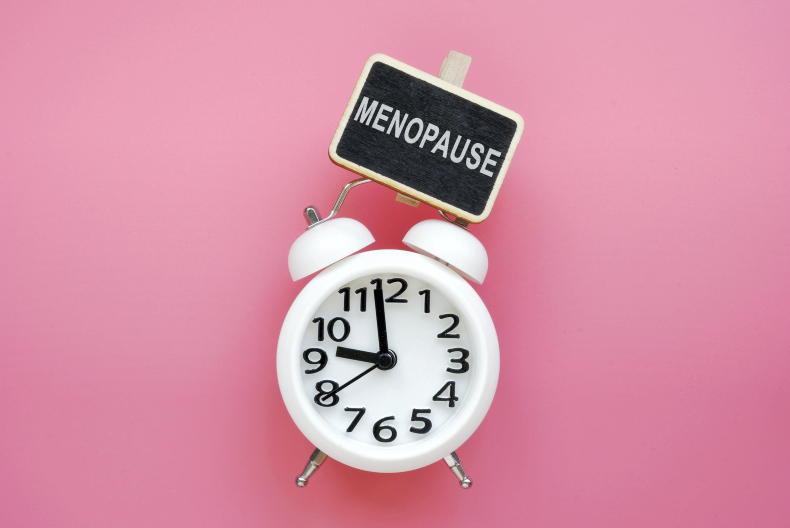“What I see with a lot of women is that they don’t actually realise what’s happening to them and they may put their perimenopause symptoms down to something else,” says Catherine O’Keeffe, who is a member of the British Menopause Society.
The average age for these symptoms to start is 45 and the average age for menopause is 51.
“Menopause* is the anniversary of 12 months without a menstrual cycle and perimenopause is everything that happens before that. That’s when the symptoms start to show themselves in a person’s body,” she adds.
Psychological changes can be the first to manifest themselves.

Catherine O'Keeffe
“Women may feel a little bit more anxious,” Catherine explains. “Their confidence drops and mood changes come in too. There can be feelings of rage and frustration and all of that can be quite scary if you don’t understand what’s happening. The most important message is: this is normal – it’s your body adapting to ever-changing hormone levels and the steady decline of oestrogen, progesterone and also testosterone. Understanding all of this can also help take away the fear.
Women feel great relief when they realise they are not going nuts, that this is all part of menopause symptoms.”
More than hot flushes
It’s important for people to realise that menopause symptoms involve much more than hot flushes and night sweats.
“Those two symptoms are just the tip of the iceberg,” Catherine says. “So much more is going on underneath the surface.”
The “sandwich years”
Women being in those middle years can add to these symptoms.
“You are caught in the sandwich years – those years when you may be parenting teenagers and looking after ageing parents, as well as trying to juggle life, work, stress and then the menopause is thrown in on top of all that,” Catherine says.
“Stress, we know, exacerbates many of the symptoms of menopause, so it’s really important to be aware of stress and make sure you’re managing it well.”
Alcohol intake, especially recently, has added to women’s (negative) experience of perimenopause, Catherine also believes.
Key symptoms
What are the symptoms that affect women aged over 45 the most?
“Psychological aspects of menopause are huge,” Catherine says. “Particularly in work, these symptoms are misunderstood and the impact they can have on a person’s life is still understated.
“The psychological aspects are far reaching. Brain fog is the most troublesome for most women, which includes memory issues.
“This reduction in cognitive function can lead to a loss of confidence, a lowering of self-esteem and with the increasing anxiety tying into that. Then there are the fluctuating moods. Menopause is complex and impacts on many levels.
“Exacerbating all this are what’s called the GSM, the genito-urinary symptoms of menopause,” she continues.
“A big part of that would be vaginal atrophy and dryness. This can be very challenging for the women who experience these symptoms.”
There are many women who will experience this, she says.
“It might be painful sex or pain in relation to the vagina or vulva area,” she explains.
“In a lot of cases, women are not comfortable discussing it with their GP. This aspect of perimenopause, we know, needs to be talked about a lot more.”
Self-diagnosis not a good idea
In relation to vaginal atrophy, some women may self-diagnose the discomfort they are experiencing as thrush.
They then buy over-the-counter products for thrush – pessaries and cream – but in actual fact, in most cases, it’s not thrush at all. Depending on how you treat it, you could actually make the symptoms worse.
“Localised oestrogen (oestrogen cream inserted or applied topically) is what you need when vaginal atrophy is the issue,” Catherine states. “Talking to your GP about your symptoms is imperative.”
The GSM symptoms of menopause can also include the bladder.
“You might have bladder issues – stress incontinence, leaking, urgency, recurring UTIs (often linked to vaginal atrophy) and so forth. These need to be addressed too,” she adds.
Joint pain is another symptom that comes up for many women.
“Whilst you can argue some of these pains may well be down to ageing, we know it is also related to hormonal changes.”
Sensitive skin?
The perimenopause years can also see you experiencing allergic reactions (to fabrics, washing powders, makeup) that have never happened before. If you have a histamine intolerance the chances are you are going to feel menopause more acutely than the average women due to the impact of the changing oestrogen levels.
Coping with symptoms
Empowering, educating and informing yourself about symptoms and how you can support yourself during this time can change your whole experience of menopause, says Catherine O’Keeffe. Here are her tips:
1 Empower yourself by learning about what the many possible symptoms of perimenopause are and when they can happen.
2 Keep on top of your health. Have regular GP check-ups to make sure there aren’t any underlying conditions that might need to be addressed, eg thyroid function, iron levels. Chat through your concerns and options.
3 Build a support network. Having support from your partner, friends, family, manager and work colleagues about what you’re experiencing will give you support as you go through what could be a bumpy time, particularly in relation to the psychological aspects of menopause. This is a great time to use your Employee Assitance Programme at work, which is a confidential independent resource and support.
4 Eat healthily. Food is so important so make sure that you’re eating a healthy diet – loads of fresh fruit, vegetables, nuts and seeds. Avoid low blood sugar levels by having healthy protein-filled snacks throughout the day. Make sure to drink plenty of water, too. There are menopause-related supplements available if you need additional support.
5 Have fun in your life. Laughter is so important because life can be intense and challenging. Spend time with people who support you. Have time for yourself and an outlet – like a hobby you love. Having that escapism in your life is very important. Let fun into your life through movement and connecting with other people.
Menopause toolkit
For the majority, a combination of everything (mentioned above) helps. Menopause is never one-size-fits-all. The tools you choose during these years are personal to you – supplements, HRT (hormone replacement therapy), natural therapies - or it can be a mix of all the above. The key is to understand what your choices are, be informed and get your own personal toolkit together. Remember, this is a time in your life when you can thrive. The Japanese have a term for menopause called “konenki”, meaning “renewal years and energy”. This is a much better mindset to adapt as you enter the perimenopause years.
Menopause in the workplace
Catherine runs menopause support training courses in many workplaces in Ireland and internationally and sees many supportive workplaces, from retail and corporate through to manufacturing.
“They are supporting their female employees and opening the conversation about menopause,” she says. “We need more of that. Women in the perimenopause age group are the fastest growing demographic in the workforce, so we know that we’ve got to support women of these ages. The wise move for companies is to support this conversation, otherwise it may result in employee retention issues, higher employment costs and lower staff morale. Openly supporting is crucial for all workplaces.”
Catherine O’Keeffe is the founder of the Menopause Success Summit. See www.menopausesuccesssummit.com
*Normal menopause is being discussed here. Bear in mind that menopause can occur earlier than average times for other reasons, medical and surgical.
Read more
Living with endometriosis
Early health warnings you shouldn’t ignore
“What I see with a lot of women is that they don’t actually realise what’s happening to them and they may put their perimenopause symptoms down to something else,” says Catherine O’Keeffe, who is a member of the British Menopause Society.
The average age for these symptoms to start is 45 and the average age for menopause is 51.
“Menopause* is the anniversary of 12 months without a menstrual cycle and perimenopause is everything that happens before that. That’s when the symptoms start to show themselves in a person’s body,” she adds.
Psychological changes can be the first to manifest themselves.

Catherine O'Keeffe
“Women may feel a little bit more anxious,” Catherine explains. “Their confidence drops and mood changes come in too. There can be feelings of rage and frustration and all of that can be quite scary if you don’t understand what’s happening. The most important message is: this is normal – it’s your body adapting to ever-changing hormone levels and the steady decline of oestrogen, progesterone and also testosterone. Understanding all of this can also help take away the fear.
Women feel great relief when they realise they are not going nuts, that this is all part of menopause symptoms.”
More than hot flushes
It’s important for people to realise that menopause symptoms involve much more than hot flushes and night sweats.
“Those two symptoms are just the tip of the iceberg,” Catherine says. “So much more is going on underneath the surface.”
The “sandwich years”
Women being in those middle years can add to these symptoms.
“You are caught in the sandwich years – those years when you may be parenting teenagers and looking after ageing parents, as well as trying to juggle life, work, stress and then the menopause is thrown in on top of all that,” Catherine says.
“Stress, we know, exacerbates many of the symptoms of menopause, so it’s really important to be aware of stress and make sure you’re managing it well.”
Alcohol intake, especially recently, has added to women’s (negative) experience of perimenopause, Catherine also believes.
Key symptoms
What are the symptoms that affect women aged over 45 the most?
“Psychological aspects of menopause are huge,” Catherine says. “Particularly in work, these symptoms are misunderstood and the impact they can have on a person’s life is still understated.
“The psychological aspects are far reaching. Brain fog is the most troublesome for most women, which includes memory issues.
“This reduction in cognitive function can lead to a loss of confidence, a lowering of self-esteem and with the increasing anxiety tying into that. Then there are the fluctuating moods. Menopause is complex and impacts on many levels.
“Exacerbating all this are what’s called the GSM, the genito-urinary symptoms of menopause,” she continues.
“A big part of that would be vaginal atrophy and dryness. This can be very challenging for the women who experience these symptoms.”
There are many women who will experience this, she says.
“It might be painful sex or pain in relation to the vagina or vulva area,” she explains.
“In a lot of cases, women are not comfortable discussing it with their GP. This aspect of perimenopause, we know, needs to be talked about a lot more.”
Self-diagnosis not a good idea
In relation to vaginal atrophy, some women may self-diagnose the discomfort they are experiencing as thrush.
They then buy over-the-counter products for thrush – pessaries and cream – but in actual fact, in most cases, it’s not thrush at all. Depending on how you treat it, you could actually make the symptoms worse.
“Localised oestrogen (oestrogen cream inserted or applied topically) is what you need when vaginal atrophy is the issue,” Catherine states. “Talking to your GP about your symptoms is imperative.”
The GSM symptoms of menopause can also include the bladder.
“You might have bladder issues – stress incontinence, leaking, urgency, recurring UTIs (often linked to vaginal atrophy) and so forth. These need to be addressed too,” she adds.
Joint pain is another symptom that comes up for many women.
“Whilst you can argue some of these pains may well be down to ageing, we know it is also related to hormonal changes.”
Sensitive skin?
The perimenopause years can also see you experiencing allergic reactions (to fabrics, washing powders, makeup) that have never happened before. If you have a histamine intolerance the chances are you are going to feel menopause more acutely than the average women due to the impact of the changing oestrogen levels.
Coping with symptoms
Empowering, educating and informing yourself about symptoms and how you can support yourself during this time can change your whole experience of menopause, says Catherine O’Keeffe. Here are her tips:
1 Empower yourself by learning about what the many possible symptoms of perimenopause are and when they can happen.
2 Keep on top of your health. Have regular GP check-ups to make sure there aren’t any underlying conditions that might need to be addressed, eg thyroid function, iron levels. Chat through your concerns and options.
3 Build a support network. Having support from your partner, friends, family, manager and work colleagues about what you’re experiencing will give you support as you go through what could be a bumpy time, particularly in relation to the psychological aspects of menopause. This is a great time to use your Employee Assitance Programme at work, which is a confidential independent resource and support.
4 Eat healthily. Food is so important so make sure that you’re eating a healthy diet – loads of fresh fruit, vegetables, nuts and seeds. Avoid low blood sugar levels by having healthy protein-filled snacks throughout the day. Make sure to drink plenty of water, too. There are menopause-related supplements available if you need additional support.
5 Have fun in your life. Laughter is so important because life can be intense and challenging. Spend time with people who support you. Have time for yourself and an outlet – like a hobby you love. Having that escapism in your life is very important. Let fun into your life through movement and connecting with other people.
Menopause toolkit
For the majority, a combination of everything (mentioned above) helps. Menopause is never one-size-fits-all. The tools you choose during these years are personal to you – supplements, HRT (hormone replacement therapy), natural therapies - or it can be a mix of all the above. The key is to understand what your choices are, be informed and get your own personal toolkit together. Remember, this is a time in your life when you can thrive. The Japanese have a term for menopause called “konenki”, meaning “renewal years and energy”. This is a much better mindset to adapt as you enter the perimenopause years.
Menopause in the workplace
Catherine runs menopause support training courses in many workplaces in Ireland and internationally and sees many supportive workplaces, from retail and corporate through to manufacturing.
“They are supporting their female employees and opening the conversation about menopause,” she says. “We need more of that. Women in the perimenopause age group are the fastest growing demographic in the workforce, so we know that we’ve got to support women of these ages. The wise move for companies is to support this conversation, otherwise it may result in employee retention issues, higher employment costs and lower staff morale. Openly supporting is crucial for all workplaces.”
Catherine O’Keeffe is the founder of the Menopause Success Summit. See www.menopausesuccesssummit.com
*Normal menopause is being discussed here. Bear in mind that menopause can occur earlier than average times for other reasons, medical and surgical.
Read more
Living with endometriosis
Early health warnings you shouldn’t ignore










SHARING OPTIONS